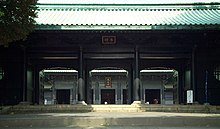fiction.wikisort.org - Writer
Hayashi Ryūkō (林 榴岡, 1681 – December 11, 1758) was a Japanese Neo-Confucian scholar, teacher and administrator in the system of higher education maintained by the Tokugawa bakufu during the Edo period. He was a member of the Hayashi clan of Confucian scholars.
Hayashi Ryūkō | |
|---|---|
 Hayashi Ryūkō, 2nd rector of Yushima Seidō | |
| Born | 1681 Edo |
| Died | 1758 Edo |
| Occupation | Neo-Confucian scholar, academic, administrator, writer |
| Subject | Japanese history, literature |
| Children | Hayashi Hōkoku, son |
| Relatives | Hayashi Hōkō, father Hayashi Gahō, grandfather Hayashi Razan, great-grandfather |
Academician
Hōkō was the fourth Hayashi clan Daigaku-no-kami of the Edo period.
Hōkō is known as the second official rector of the Shōhei-kō.[1] This academy would come to be known as the Yushima Seidō) . This institution stood at the apex of the country-wide educational and training system which was created and maintained by the Tokugawa shogunate. Ryūkō's hereditary title was Daigaku-no-kami, which, in the context of the Tokugawa shogunate hierarchy, effectively translates as "head of the state university.[2]
See also
- Hayashi clan (Confucian scholars)
Notes
- Nussbaum, Louis Frédéric et al. (2005). Japan Encyclopedia, p. 880.
- De Bary, William et al. (2005). Sources of Japanese Tradition, Vol. 2, p. 443.
References

- De Bary, William Theodore, Carol Gluck, Arthur E. Tiedemann. (2005). Sources of Japanese Tradition, Vol. 2. New York: Columbia University Press. ISBN 9780231129848; OCLC 255020415
- Nussbaum, Louis Frédéric and Käthe Roth. (2005). Japan Encyclopedia. Cambridge: Harvard University Press. ISBN 978-0-674-01753-5; OCLC 48943301
External links
Другой контент может иметь иную лицензию. Перед использованием материалов сайта WikiSort.org внимательно изучите правила лицензирования конкретных элементов наполнения сайта.
WikiSort.org - проект по пересортировке и дополнению контента Википедии